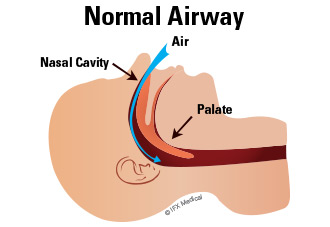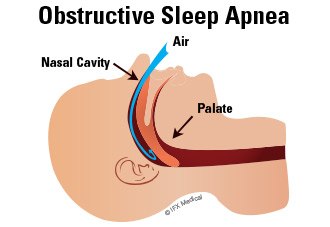
Sleep apnea is a chronic condition in which breathing patterns routinely stop during sleep. These lapses in breathing may last up to several minutes, and may happen 30 times or more in one hour.
The most common form of sleep apnea is obstructive sleep apnea. In this condition, the airway becomes blocked as a person sleeps, leading to cessation of breathing and shallow breaths. Someone with sleep apnea will often not realize they have difficulty sleeping. The lapses in breathing will prevent them from reaching deep sleep, but will not cause them to fully wake.
Obesity is a leading risk factor for obstructive sleep apnea. Excess weight, especially in the fat pads of the neck, can block airways which causes the breathing difficulties.


Symptoms
When someone has sleep apnea, they will often snore loudly or make a choking sound as they catch their breath. This is the most common sign of sleep apnea. Loud snoring will often wake a partner or family member. It is not uncommon for sleep apnea to go undetected until a family member brings excessive snoring to the patient’s attention.
Signs and symptoms of sleep apnea include:
- Cessation of breathing while sleeping
- Headaches, especially in the morning
- Excessive snoring
- Sore throat
- Difficulty concentrating
- Fatigue
- Depression, irritability and mood swings
- Frequent nighttime urination
Sleep apnea is the most common cause of excessive daytime sleepiness. Not all instances of snoring are related to sleep apnea. If someone struggles with snoring, a sleep study can determine if the cause is a blocked air passage or another non-sleep apnea related issue.
Treatment for Sleep Apnea
The goal of sleep apnea treatment is to restore regular breathing during sleep, which improves quality of sleep. Sleep apnea is generally treated through a combination of lifestyle changes, breathing assistance and surgery.
For those with mild sleep apnea, a series of behavioral changes can sometimes alleviate symptoms. These include:
- Weight loss
- Avoid alcohol and tobacco use
- Use allergy medications to keep nasal passages open
- Sleep on your side instead of your back to alleviate pressure on the airways
The most common form of treatment for sleep apnea uses a CPAP machine (continuous positive airway pressure). This machine gently blows air down your throat using a mask that sits over your mouth and nose. The pressure from the air keeps breathing passages open, helping you to breathe properly as you rest.
Surgical widening of the airways is used in extreme situations to correct breathing. Since losing weight can greatly improve sleep apnea, weight loss surgery is often recommended prior to sleep apnea surgery. Weight loss following gastric sleeve surgery can greatly reduce the severity of sleep apnea.


